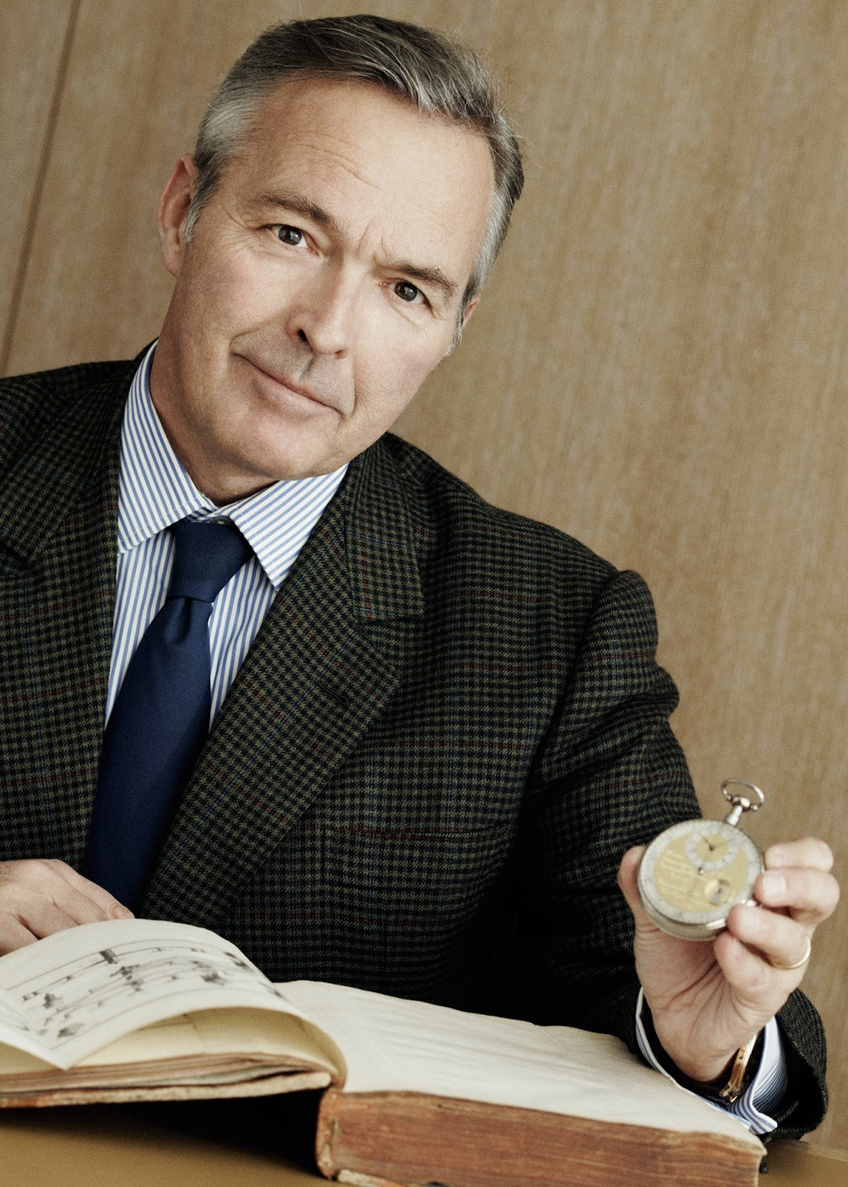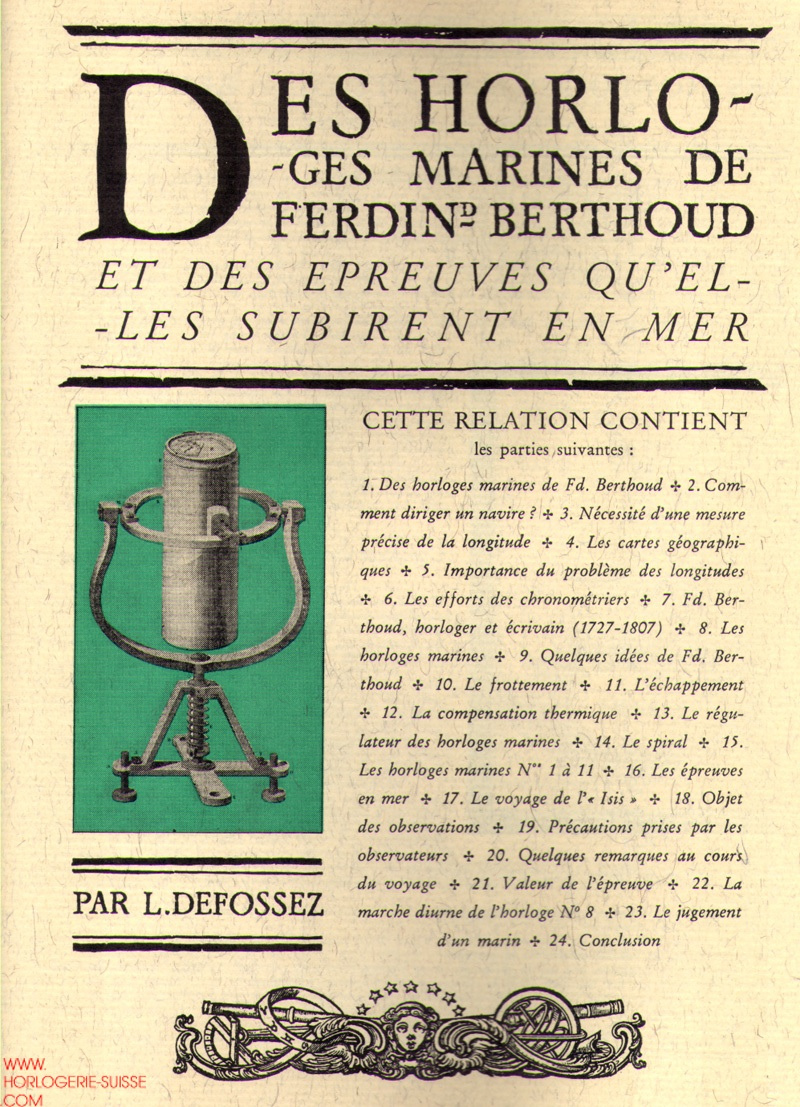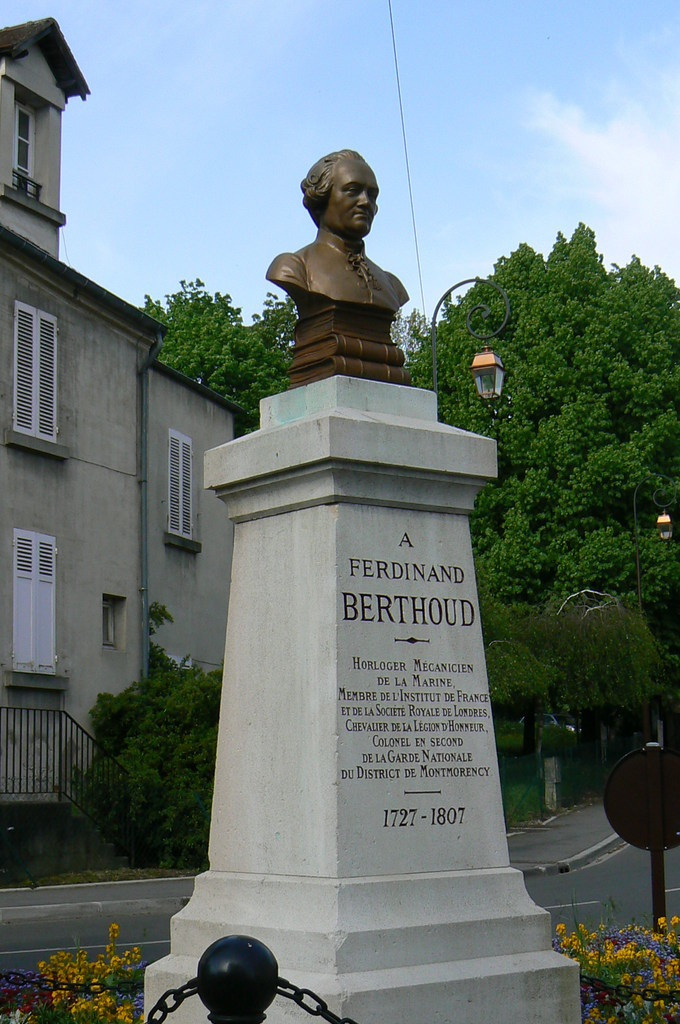

Exclusive: Jean-Claude Nicolet Tells Ferdinand Berthoud (1727-1807) Story - Part 2
Jean-Claude Nicolet, a former watchmaking professor who some regard as “the last of the great ‘orlogeurs’” gave a talk at the MIH in 2003. Here is the rest of the exclusive historical excerpts in the form of a biography.
The document was too long to be published in one go. You can read the first part here. This second part goes over the story told by one of the greatest watchmaking minds of our time, in his strong local accent and intricate language. The professor emeritus from La Chaux-de-Fonds, tells us about the life and career of the great Neuchâtel-based chronometer-maker Berthoud was undoubtedly the greatest watchmaking writer in spite of having been outshone by more celebrated contemporaries. However, his name has been in the limelight in the last few months thanks to the brand that Karl-Friedrich Scheufele, co-owner of Chopard, launched in his name.

Ferdinand Berthoud: childhood, youth and ambitions
He was born into a wealthy family on March 18, 1727 in Plancemont sur Couvet. His father, Jean Berthoud, was Val de Travers’ Justice as well as an architect and a farmer. The three professions were not at all incompatible. In fact, an architect then referred to a building contractor, or rather a master-mason or a carpenter who built houses in the country or abroad. Ferdinand Berthoud was a smart and boisterous young imp, with a lively mind and a fiery temper, and thus quite a ne'er-do-well. But since he liked studying, his parents wanted him to be a “minister”, which was the equivalent of a reverend, not so long ago. (…) But just as it happened with Pierre Jaquet-Droz – who was six years older than Berthoud – watchmaking won over religious calling. It must be noted that these great watchmakers were born and lived in the golden age of watchmaking, which saw the greatest artist-watchmakers, the finest inventions and the most outstanding pieces.
Berthoud must have personally been acquainted with or, at least have heard of Jaquet-Droz. Indeed, he was famous both in Switzerland and abroad. Vaucanson, the famous automata designer, is said to have told the latter: “Young man, I would have liked to finish where you started”.
He was a disciple of Daniel Bernoulli at the University of Basel. The inhabitants of the Jura Mountains were not old-fashioned provincials. As it is, Jean-Jacques Rousseau did not hide his admiration for the “Montagnons” and their culture. After a little training at the workshop of his brother and – it would seem – at Vaucher in Fleurier, Berthoud left for Paris at a very young age. When he reached the hub of craftspeople and scholars, he wrote to his compatriot Pierre Jaquet-Droz at the age of 26. In his letter, he expressed his concerns and the various paths that would help him fulfill his ambitions. This letter was a precursor of the man Berthoud would become.
The letter about watchmaking and watchmakers of his time
The first known paper written by Berthoud is his “letter about watchmaking” that was published in the “Journal Helvétique” and was addressed to Mr. P.J.D in Neuchâtel, Switzerland (the initials most probably stood for Pierre Jaquet-Droz). The letter was highly interesting because it provided useful information about French watchmakers of the time and the differences they argued about. However, the most relevant part was his hesitation concerning the choices he had to make at the beginning of what seemed to be a promising career.
It gave an insight into what the experimental and literary work of the future mechanic watchmaker of the navy would be. It also hinted at a certain antipathy between Berthoud and he who would then become his biggest rival, Pierre Le Roy.

In the letter, he expressed a particular respect for a Mr Henry Sully, a precursor of chronometry. He said: “His science and his love for perfecting watchmaking makes Mr. Sully, a Briton, commendable. He has written ‘Règle artificielle du temps’ that has been reprinted several times. Upon reading his work with the addition by Mr. Julien Le Roy, Mr. Sully's merit becomes apparent”. Thiout is only mentioned once: “Mr. Thiout is quite famous thanks to his watchmaking treaty”. His disinterest stems from the fact that he found next to nothing useful in the big book that Thiout wrote: “Traité d'horlogerie”.
On the first page of his paper entitled "Essai sur l'horlogerie", Berthoud wrote: “I haven't found any books with proper instructions that help to design good time-measuring instruments as the current watchmaking books available only describe existing instruments and only mention a few principles, as if they had nothing to do with time-measuring instruments”.
Indeed, both Thiout and Lepaute used to focus more on work etiquette than on elaborating on principles, except for the detailed explanations concerning gears. These were, however, additions by other authors: Lalande for Lepaute and Camus and Enderlin for Thiout.
Even though Berthoud did not know Enderlin personally, he showered praise on him. “Watchmaking suffered a great loss when he died. If we were to judge what he could have achieved by what he did, he would have been unique”. Enderlin was from Basel. Mr. de Rivaz, a watchmaker from Valais who was established in Paris was also the subject of his praise. Did Berthoud have a soft spot for his compatriots? Quite possibly. However, he defended himself: “A thinking man will never let countries or ranks have any impact whatsoever on science. Yet, he may be flattered to learn that one of his compatriots is doing well for himself”. “Rivaz is one of them. He absolutely masters the theory and principles of his art and has brought mechanics to perfection. He has invented many things and hence it is no matter of favor that the king has granted exclusive privilege for his clocks that are wound only once a year. His merit and his expertise have everything to do with it”.
A quest for success and fortune
Berthoud wrote quite a long passage about a feud that Mr. de Rivaz held against watchmakers in Paris. His main opponent was Pierre Le Roy who wrote a piece about which Berthoud had the following to say: “If he had removed some of the unnecessary witticisms against the Nation (Swiss people) and dispensed more energy in illustrations rather than jibes, he would have been more credible”. It is exciting to think that the antagonism between those two great chronometer-makers, of whom we will speak later on, may have been at the origin of some of Le Roy's jokes about Swiss people.
In terms of the choice that Berthoud had to make at the beginning of his career in France, he wrote: “The various articles that contribute to the progress of Science and Art imply a wish to acquire the fame and emulation that comes with the reward a prince gave to the merit and the communication of ideas and works of scholars. Far from me to lay claim to this title – I will always be an artist – I can nevertheless use this means to contribute to the evolution of the Art I have dedicated myself to”.

It also surfaces that Berthoud was considering the possibility of making money with a luxury business. He mentioned “Mr. Baillon, watchmaker of the Queen who has a thriving business uses diamonds to decorate both his watches and clocks. His workshop is constantly buzzing with craftspeople he has hired and he personally sees to a large amount of the work. He could have lightened his workload substantially had he bothered to look for new ways to evolve like many others have. People who want to work for themselves must not be designers since, just like writers, they are not rewarded well enough”.
DON'T FORGET TO READ THE PART 1
http://www.ferdinandberthoud.ch/











